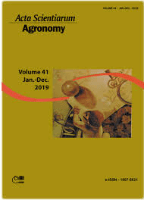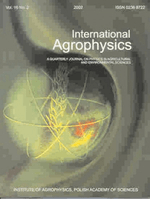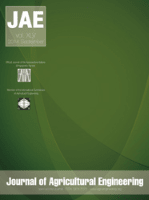
APPLIED ENGINEERING IN AGRICULTURE
Scope & Guideline
Transforming Agriculture Through Innovative Engineering Solutions.
Introduction
Aims and Scopes
- Precision Agriculture Technologies:
Research on the use of advanced technologies, such as sensors, drones, and data analytics, to optimize agricultural practices and improve crop management. - Soil and Water Management:
Studies addressing the management of soil and water resources, including irrigation systems, drainage solutions, and the impact on crop yield and sustainability. - Agricultural Machinery and Equipment Design:
Development and evaluation of innovative machinery and equipment designed to enhance efficiency in agricultural operations, from planting to harvesting. - Environmental Impact Assessments:
Research focusing on the environmental implications of agricultural practices, including soil health, water quality, and emissions from agricultural operations. - Biotechnology and Crop Improvement:
Investigation of biotechnological approaches and genetic improvements in crops to enhance yield, quality, and resistance to pests and diseases. - Food Safety and Quality Control:
Studies aimed at ensuring food safety through improved processing techniques, quality control measures, and innovative preservation methods.
Trending and Emerging
- Integration of Artificial Intelligence in Agriculture:
The use of AI and machine learning for predictive analytics, disease detection, and yield optimization has surged, indicating a trend towards smart agriculture. - Sustainable Agricultural Practices:
An increasing focus on sustainability, including studies on regenerative agriculture, resource conservation, and environmental stewardship in farming practices. - Remote Sensing and Precision Monitoring:
A growing interest in remote sensing technologies and precision monitoring techniques to enhance crop management and environmental assessments. - Automation and Robotics in Farming:
Research on the development and implementation of automated systems and robotics for various agricultural tasks is on the rise, reflecting the need for efficiency and labor reduction. - Data-Driven Decision Making:
There is a notable trend towards utilizing big data and analytics for decision-making in agriculture, emphasizing the importance of data in improving agricultural practices.
Declining or Waning
- Traditional Soil Fertility Practices:
Research on conventional soil fertility practices is decreasing as more emphasis is placed on precision agriculture and sustainable practices that utilize technology for soil management. - Conventional Irrigation Methods:
The focus on traditional irrigation techniques is waning in favor of more advanced, technology-driven irrigation systems that optimize water use efficiency and adapt to climate variability. - Static Crop Yield Models:
There has been a decline in studies using static models for predicting crop yields, as dynamic and data-driven approaches become more relevant due to the integration of real-time data and machine learning. - Manual Harvesting Techniques:
Research on manual harvesting methods is decreasing as automated and mechanized solutions gain traction, reflecting a broader trend towards labor-saving technologies in agriculture.
Similar Journals

AgriEngineering
Connecting Researchers to Revolutionize Food ScienceAgriEngineering is a premier Open Access journal, published by MDPI, focusing on innovative research across the disciplines of agronomy, horticulture, food science, and engineering. Established in 2019 and headquartered in Basel, Switzerland, this journal has rapidly gained recognition, evidenced by its robust performance in the Scopus rankings and its positioning in Q1 and Q2 quartiles of key categories, including Horticulture and Agronomy. With a commitment to disseminating high-quality research that advances agricultural engineering practices, AgriEngineering provides a platform for researchers, professionals, and students to explore cutting-edge developments aimed at enhancing food production systems and sustainability. Its Open Access model ensures wide-reaching accessibility to vital research outcomes, empowering global collaboration and innovation in the field. For more information on submission and access, you can visit the AgriEngineering website.

Revista Ciencia Agronomica
Cultivating knowledge for a greener tomorrow.Revista Ciencia Agronomica is a leading open access journal published by the Universidade Federal do Ceará, Departamento de Geociências, dedicated to advancing the field of agricultural sciences. Established in 2008, the journal has emerged as a significant platform for the dissemination of original research and innovative advancements in areas including agronomy, horticulture, and soil science, with a dedicated convergence of years extending to 2025. With an impactful presence in academic circles—ranking in Q3 for Agronomy and Crop Science and Soil Science and Q2 for Horticulture in 2023—this journal provides vital insights for researchers and practitioners alike. Although specific HIndex metrics are currently unavailable, the journal's Scopus rankings attest to its relevance, placing it in the 52nd, 44th, and 43rd percentiles across multiple pertinent categories. Since transitioning to an open access model in 2010, Revista Ciencia Agronomica has committed to maximizing the reach and impact of its published work, thereby ensuring valuable contributions to global agricultural knowledge.

AIMS Agriculture and Food
Bridging disciplines for a secure food future.AIMS Agriculture and Food is a leading open access journal published by the American Institute of Mathematical Sciences (AIMS), focused on the critical intersections of agricultural and food sciences. Since its inception in 2016, this journal has provided a vital platform for disseminating innovative research and advancements in the fields of agricultural and biological sciences and food science. With impressive Scopus rankings, including a Q2 categorization in 2023 for both Agricultural and Biological Sciences (miscellaneous) and Food Science, AIMS Agriculture and Food is recognized for its significant contributions to the academic community. The journal aims to foster interdisciplinary dialogue by welcoming submissions that tackle contemporary challenges, promote sustainable practices, and enhance food security. Researchers, professionals, and students will find this journal an invaluable resource, offering open access to high-quality, peer-reviewed articles that are essential for informed decision-making in agriculture and food industries.

ACTA SCIENTIARUM-AGRONOMY
Innovating agronomy through groundbreaking research.ACTA SCIENTIARUM-AGRONOMY is a prestigious, peer-reviewed journal published by UNIV ESTADUAL MARINGA, PRO-REITORIA PESQUISA POS-GRADUACAO, focusing on advanced research in the field of agronomy and crop science. Since its inception as an Open Access journal in 2007, it has significantly contributed to disseminating high-quality research, allowing unrestricted access to its content for a global audience. Operating from Brazil, the journal holds a notable Q2 category ranking in Agronomy and Crop Science as of 2023, validating its importance within the academic community. The journal’s Scopus ranking positions it in the 49th percentile among Agricultural and Biological Sciences, indicating a robust foundation for impactful research. With a commitment to innovation and scientific excellence, ACTA SCIENTIARUM-AGRONOMY aims to provide researchers, professionals, and students with vital insights that drive forward our understanding of agriculture and its environmental implications.

International Agrophysics
Exploring the intersection of science and sustainability.International Agrophysics is a prestigious open-access journal published by the Polish Academy of Sciences, Institute of Agrophysics. Since its inception in 1989, the journal has provided a vital platform for disseminating innovative research across various domains, primarily focusing on Agricultural and Biological Sciences, Fluid Flow and Transfer Processes, and Soil Science, garnering a commendable Q2 ranking in several of these fields as of 2023. The journal's commitment to open access since 2012 underscores its mission to enhance the visibility and accessibility of scientific knowledge, benefiting not only researchers and professionals but also students who seek to further their understanding of these essential disciplines. With an emphasis on interdisciplinary approaches, International Agrophysics invites cutting-edge research that addresses contemporary challenges within the agricultural and environmental sectors. As a key resource for impactful studies, the journal plays a crucial role in fostering collaboration among scientists and policymakers, ultimately contributing to sustainable agricultural practices and environmental resilience.

Journal of the ASABE
Transforming Research into Real-World ApplicationsJournal of the ASABE, published by the American Society of Agricultural and Biological Engineers, serves as a pivotal platform for disseminating cutting-edge research in various disciplines, including Agronomy, Crop Science, Biomedical Engineering, Food Science, Forestry, and Soil Science. With an impact factor that reflects its significance and reach, the journal ranks in the Q2 and Q3 quartiles across numerous categories in 2023, showcasing its commitment to advancing knowledge in agricultural and biological engineering. Authored by leading experts, the journal offers accessible articles on innovative methodologies, technologies, and sustainable practices essential to the global agricultural and environmental landscape. Open access options ensure that research findings are readily available to a broad audience, promoting collaboration and knowledge sharing among researchers, professionals, and students alike. With a strategic focus on research convergence into 2024, Journal of the ASABE is poised to shape the future of engineering solutions in agriculture and beyond.

Journal of Agricultural Engineering
Advancing Agricultural Innovation for a Sustainable FutureThe Journal of Agricultural Engineering, published by PAGEPRESS PUBL, is a vital resource for researchers, professionals, and students engaged in the fields of agricultural technology and engineering. With an ISSN of 1974-7071 and an E-ISSN of 2239-6268, this Open Access journal has been disseminating valuable research since 2007, making significant strides in the accessibility of research findings. Based in Italy, the journal aims to bridge the gap between theoretical approaches and practical applications in agricultural engineering, focusing on innovative solutions to contemporary challenges in the sector. The journal has achieved respectable Scopus rankings, including #192/384 in Industrial and Manufacturing Engineering, highlighting its relevance and contribution to the field despite its Q4 and Q3 quartile rankings in related categories. The convergence of knowledge from 2012 to 2024 captures an evolving perspective on agricultural engineering practices, enhancing its appeal for those striving to advance the discipline. As an open-access platform, the journal ensures that cutting-edge research is readily available, fostering collaboration and knowledge sharing in a rapidly changing world.

Agrosystems Geosciences & Environment
Advancing sustainable practices in agrosystems and geosciences.Agrosystems Geosciences & Environment, published by WILEY, is a premier open access journal dedicated to advancing the interdisciplinary field of agricultural and environmental sciences. With an E-ISSN of 2639-6696, the journal has gained recognition since its inception in 2018, currently holding a Q2 ranking in Agricultural and Biological Sciences, Plant Science, and Soil Science. Operating from the United Kingdom, Agrosystems Geosciences & Environment contributes significantly to knowledge generation and dissemination, offering vital insights into sustainable practices, soil management, and crop optimization. Researchers and professionals will find the open access model particularly advantageous, promoting greater visibility and engagement within the scientific community. By bridging the gap between geosciences and agrosystem management, this journal is vital for those committed to addressing today's critical environmental challenges.

AGRONOMIA MESOAMERICANA
Inspiring change through cutting-edge agricultural research.AGRONOMIA MESOAMERICANA is a distinguished open-access journal published by UNIV COSTA RICA, dedicated to advancing knowledge in the fields of agronomy, crop science, food science, and soil science. Since its inception in 1990, the journal has provided a platform for researchers and professionals to disseminate their findings, contributing significantly to the agricultural sciences. With an E-ISSN of 2215-3608, it operates from Costa Rica, specifically from the Centro Investigaciones Agronómicas, situated in San José. Despite its current classification in the Q4 quartile for 2023 in the respective fields, it aims to stimulate academic discourse and inspire innovative solutions to pressing agricultural challenges. The journal attracts a diverse audience and encourages submissions that focus on sustainable practices, food security, and environmental stewardship, making it an essential resource for researchers, professionals, and students alike seeking to enrich their understanding and share crucial insights in the agronomy landscape. Open access ensures that all published research is freely available, fostering collaboration and knowledge exchange worldwide.

Revista de la Facultad de Agronomia de la Universidad del Zulia
Fostering Dialogue: Connecting Ideas in Agronomy and BeyondWelcome to the Revista de la Facultad de Agronomia de la Universidad del Zulia, a key publication in the fields of Agronomy, Animal Science, Food Science, and Plant Science. Published by the Facultad de Agronomía, Universidad del Zulia, this journal aims to foster academic dialogue and disseminate impactful research that advances knowledge and practice within these disciplines. Operating under the ISSN 0378-7818 and E-ISSN 2477-9407, this journal offers a platform for both emerging and established scholars to share their discoveries and innovations. Despite its challenges, as reflected in its Q4 ranking across multiple categories in 2023, it remains a vital resource for the Venezuelan scientific community and beyond. Readers will benefit from a diverse array of studies and discussions that address contemporary issues in agriculture and related fields, helping inform best practices and policy. Engage with cutting-edge research from Venezuela and contribute to the development of agronomic sciences in the region.